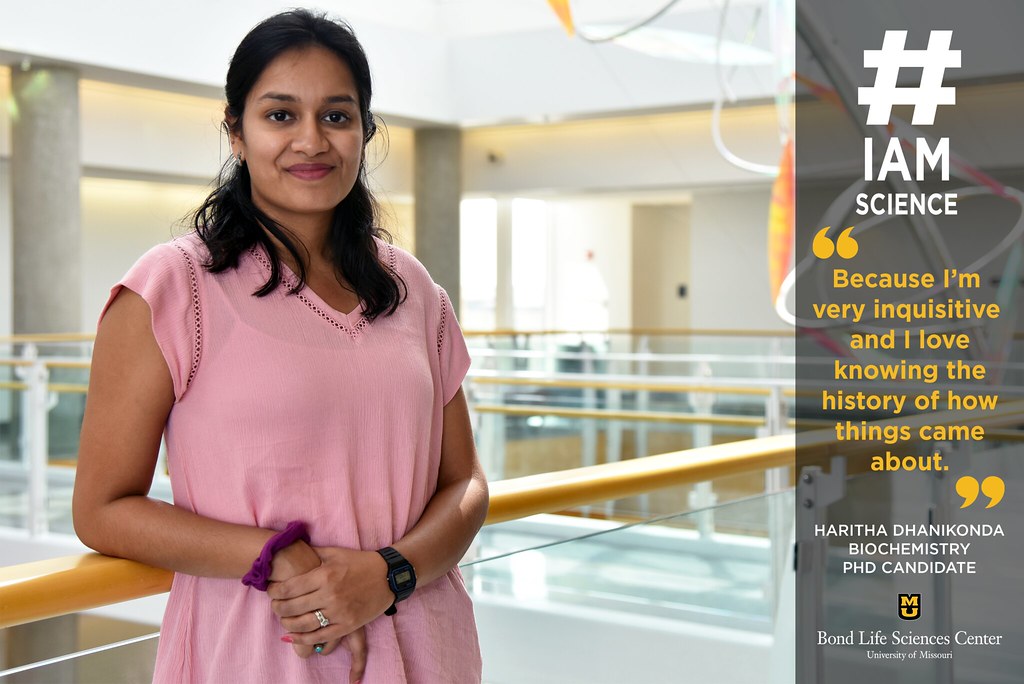Published on

By Mariah Cox
There is no shortage of complexities to be solved on Earth, but for Haritha Dhanikonda our discoveries here can be used to further our knowledge of the celestial bodies in the universe.
That interest landed her in the lab of Donald Burke in Bond LSC where their RNA work is funded in part by NASA, but her interest beyond this planet started much earlier.
From a young age, Dhanikonda was fascinated by space and the possibility of life in other parts of the universe.
Visiting planetariums as a kid in India, reading encyclopedia books on astronomy, biology and geography in school and looking up at the stars in awe of the vastness of the universe, she was hooked from the beginning.
“I read the book “Deception Point” by Dan Brown in the eighth grade, and that’s what got me interested in space,” Dhanikonda said. “His book was based on life outside Earth and how life evolved on Earth, and from then on it just fascinated me.”
Dhanikonda obtained her bachelor’s degree at Anna University in Tamil Nadu, India. There she studied biotechnology and discovered the possibility of studying life outside earth at the molecular level. From there, she moved to Dallas to pursue a Masters in Cell and Molecular Biology at the University of Texas.
“Initially when I was doing my bachelor’s, the academic focus was on how human beings and diseases came about,” Dhanikonda said. “That was more tangible to me and I could relate to it. As I did my master’s degree and now my Ph.D., I can actually see how life works at a molecular level.”
Only in the first year of her Ph.D. program, she hasn’t yet started the research for her doctoral dissertation but she’s looking to studying RNA and how it has enzymatic activity and can function biologically.
Specifically, Dhanikonda will be conducting research to look for enzymatic relics that could potentially support the RNA World Theory.
The RNA World Hypothesis was proposed by Carl Woese, Francis Crick and Leslie Orgel in the 1960s and is based on the discovery of ribosomes that suggest that before DNA, RNA stored genetic information and catalyzed chemical reactions.
“DNA is very similar to RNA. RNA is a more transient component, but there’s a theory that says that before DNA came about, it was RNA that was doing all the work,” Dhanikonda said. “There are very few examples of RNA functioning as enzymes, but we are trying to study the evolution of RNA.”
In the future, Dhanikonda hopes to work for a space agency. She wants to apply her research on the evolution of RNA to the possibility of finding that same phenomenon occurring outside of earth.
Dhanikonda came to Mizzou after a graduate school recruitment event drew her to the Ph.D. program because of everyone’s friendliness.
“It played a key role in my choosing to come to Mizzou,” Dhanikonda said. “I got to interact with a lot of faculty and they had questions for me as well. I got a sense that the department was very closely knit, students supported each other and the faculty cared a lot about students.”
While visiting other universities, Dhanikonda remembers other doctoral students warning her against pursuing a Ph.D., but when she came to MU, she got the sense that everyone was happy in their programs.
“It was something I never observed in a Ph.D. student, and I thought it was a good sign that this was the place to go for my Ph.D.,” Dhanikonda said.
When asked whether the program has met her expectations, Dhanikonda expressed her happiness with attending MU.
“I didn’t know it would play such a big role but it translates into your work. When you have a good mindset, it makes you happier working,” Dhanikonda said.